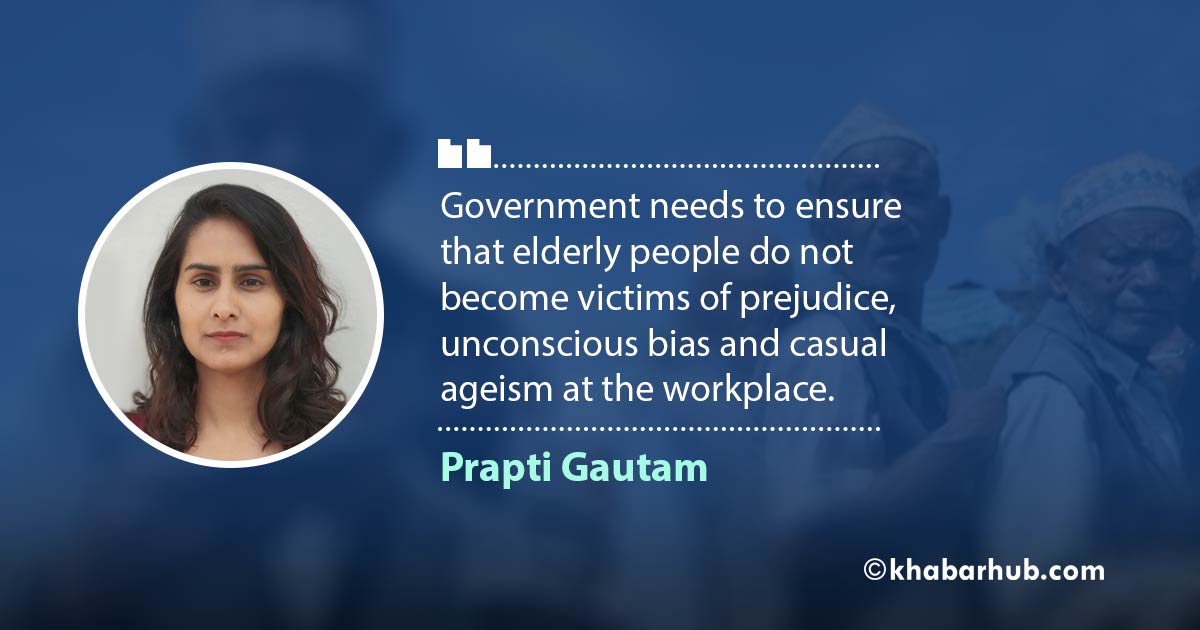0%

Right to work is a fundamental right of every human being where they engage in productive employment and may not be prevented from doing so.
However, older people especially women face ageism when it comes to job recruitment or starting their own business.
“When I was young, my neighbors used to ask me to join them to work in her field, mainly for rice plantation. I used to earn money then. Now they don’t invite me since I have grown older,” says 61-year-old Janaki.
Generally, people have the assumption that getting older means getting weaker or incapable. “Therefore, they do not provide working opportunities,” she adds.
With the increase of life expectancy in Nepal to 70 years of age, a significant number of elderly people who still can work or are in a need for a job, are often considered worthless, except a few exceptions.
Janaki is just a representational case. Thousands of aged senior citizens like Janaki undergo ageism.
At what age older people are too old to work?
Janaki still has the enthusiasm to work despite her retirement. However, she feels rejected by society due to her age.
With the increase of life expectancy in Nepal to 70 years of age, a significant number of elderly people who still can work or are in a need for a job, are often considered worthless, except a few exceptions.
According to the new Nepal Labor Law, 2017, regular employment ends at the age of 58. But an employer can hire someone who is 66 if he/she can fulfill the responsibilities. This practice, however, has not much been followed.
In the European Member States, the age for general retirement is 65 years. Spain, Germany, and France, too, are planning to raise their retirement age from 65 to 67 years, while the goal is 68 years in Britain and Ireland.
Shiva Ram, 72, is one such example. “I tried to get involved in work to become independent. However, I was discarded every time,” he lamented.
The changes in retirement ages are scheduled to take place between 2020 and 2030. In South Asia, Bangladesh and Nepal are the only two countries which have set the retirement age below 60.
Bangladesh has no immediate plan to raise the retirement age. However, Nepal has already prepared the draft of the bill to increase the age limit by two years fixing it at 60.
Ageism and the work availability for elderlies
Although ageism affects the available work opportunities for older people, the issue has not been talked quite often. According to the World Health Organization (WHO), ageism is a stereotype, prejudiced and discriminatory on the basis of age.
Various high and middle-income countries have implemented anti-discrimination laws. The Decent Work Country Programme (DWCP) for the Democratic Republic of Nepal was launched on 15th October 2018 which covers the period from 2018-2020 to enable decent work for all through sustainable, inclusive and gender-responsive economic growth and strengthening institutional capacities, enhancing social dialogue and applying fundamental conventions and other labor standards.
However, older people have not been much benefited by this.
Homnath, 65, is one of them. “I very much understand that elderly people lack a proper platform to work and earn. People do not even realize that older person, too, have skills and experiences. So, they are often confined within the four walls, and to live in a financial crisis — sometimes as a burden for the bread-winners”.
Though WHO says age is not a reliable indicator when judging a worker’s potential productivity or employability, several organizations have a mandatory retirement age. This will only discourage the elderly people’s ability to contribute and affects the organization as well since it loses capabilities and experience of experienced workers.
Shiva Ram, 72, is one such example. “I tried to get involved in work to become independent. However, I was discarded every time,” he lamented.
Japan’s population, however, has progressed at a higher speed than any other developed countries. Japan’s labor force decreased by 14.5 million over the past six years. Therefore, to achieve sustainable growth in the economy, they have increased the participation of elderly people.
An overwhelming number of elderly employees has been re-hired as irregular workers, if not full-time workers. Various surveys show that their salary scale has been reduced to 50-70 percent of what they used to earn as full-time regular employees. This has been a major challenge as they are only paid wages corresponding to their productivity.
In the latest report of 2018, $3.5 trillion could be added to the Organization for Economic Co-operation and Development (OECD) economic overall if the retirement age was increased.
If New Zealand’s performance on the employment of older workers were matched, the GDP boost could be high as 23% for Greece, 20% for Belgium and 9% for the UK.
In Nepal, despite a lot of literature on age discrimination, it lacks research in the areas of age discrimination when it comes to employment for older people.
There has been no consideration of the quality of jobs and working condition in the policy that supports the extending working life. There have been challenges while recruiting and retaining an experienced, skilled workforce even in the private sector.
Therefore, the government needs to work to ensure that elderly people do not become victims of prejudice, unconscious bias and casual ageism in the workplace.